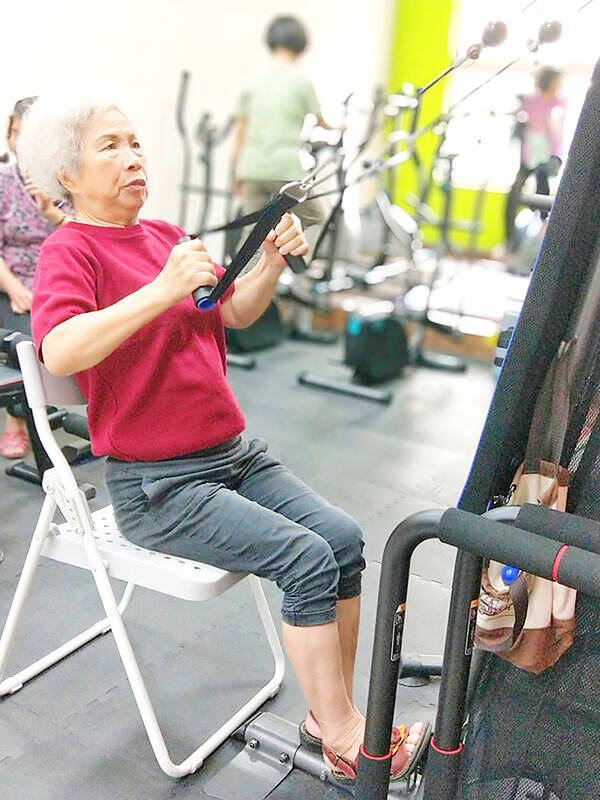The prevalence rate of hip fractures in Taiwan is the highest among Asian countries, the Taiwanese Osteoporosis Association (TOA) said yesterday, adding that osteoporosis is a “silent killer” that has no obvious symptoms and that the mortality rate following a hip fracture can be higher than some types of cancers.
The association on World Osteoporosis Day yesterday reminded people of bone health and osteoporosis prevention, as people can lose bone density without symptoms and have higher risk of bone fractures.
Osteoporosis is a “silent killer,” because many patients are unaware of their bone loss until they experience a fracture, TOA chairperson and Kaohsiung Medical University Chung-Ho Memorial Hospital orthopedist Chen Chung-hwan (陳崇桓) said.

Photo: Lin Liang-che, Taipei Times
After a person experiences a bone fracture, the risk of having another bone fracture in the next three to six months increases by five times, he said.
A bone fracture also often leads to a series of complications, including bedsores, pneumonia, urinary tract infection, and inflammation of a vein, Chen said, adding that being bedridden for a long time can also cause malnutrition or depression, significantly decreasing their life quality.
The prevalence rate of hip fracture in Taiwan is the highest among Asian countries and ranks ninth highest in the world, he said.
Foreign and local studies have shown that the one-year mortality after sustaining a hip fracture is estimated to be between 10 percent and 20 percent, which is relatively high — even higher than some types of cancers, Chen said.
Mortality rates in the first year after a hip fracture are between 20 percent and 24 percent, and the increased risk of dying might persist for at least five years afterwards, the International Osteoporosis Foundation’s factsheet showed.
Loss of function and independence among hip fracture survivors is profound, with 40 percent unable to walk independently, 60 percent requiring assistance a year later, and 33 percent are totally dependent or in a nursing home in the year following a hip fracture, the factsheet said.
Peak bone mass is usually achieved by the age of 25, and people start to lose bone mass past 40 years old, Chen said, adding that menopause significantly speeds bone loss, so postmenopausal women are at significant risk for osteoporosis.
If postmenopausal women have signs of “a stooped posture, loss of body height, or lower back pain,” they are recommended to get a non-invasive dual-energy X-ray absorptiometry (DXA) scan to measure their bone density, Chen said.
He also suggested postmenopausal women, men aged 70 or older, people who are taking long-term steroid treatment, and people aged 50 or older who have experienced a bone fracture or who are at risk for osteoporosis to get bone density screening regularly.

Taiwan is to commence mass production of the Tien Kung (天弓, “Sky Bow”) III, IV and V missiles by the second quarter of this year if the legislature approves the government’s NT$1.25 trillion (US$39.78 billion) special defense budget, an official said yesterday. Commenting on condition of anonymity, a defense official with knowledge of the matter said that the advanced systems are expected to provide crucial capabilities against ballistic and cruise missiles for the proposed “T-Dome,” an advanced, multi-layered air defense network. The Tien Kung III is an air defense missile with a maximum interception altitude of 35km. The Tien Kung IV and V

The disruption of 941 flights in and out of Taiwan due to China’s large-scale military exercises was no accident, but rather the result of a “quasi-blockade” used to simulate creating the air and sea routes needed for an amphibious landing, a military expert said. The disruptions occurred on Tuesday and lasted about 10 hours as China conducted live-fire drills in the Taiwan Strait. The Civil Aviation Administration (CAA) said the exercises affected 857 international flights and 84 domestic flights, affecting more than 100,000 travelers. Su Tzu-yun (蘇紫雲), a research fellow at the government-sponsored Institute for National Defense and Security Research, said the air

Taiwan lacks effective and cost-efficient armaments to intercept rockets, making the planned “T-Dome” interception system necessary, two experts said on Tuesday. The concerns were raised after China’s military fired two waves of rockets during live-fire drills around Taiwan on Tuesday, part of two-day exercises code-named “Justice Mission 2025.” The first wave involved 17 rockets launched at 9am from Pingtan in China’s Fujian Province, according to Lieutenant General Hsieh Jih-sheng (謝日升) of the Office of the Deputy Chief of the General Staff for Intelligence at the Ministry of National Defense. Those rockets landed 70 nautical miles (129.6km) northeast of Keelung without flying over Taiwan,

City buses in Taipei and New Taipei City, as well as the Taipei MRT, would on Saturday begin accepting QR code payments from five electronic payment providers, the Taipei Department of Transportation said yesterday. The new option would allow passengers to use the “transportation QR code” feature from EasyWallet, iPass Money, iCash Pay, Jkopay or PXPay Plus. Passengers should open their preferred electronic payment app, select the “transportation code” — not the regular payment code — unlock it, and scan the code at ticket readers or gates, General Planning Division Director-General Liu Kuo-chu (劉國著) said. People should move through the